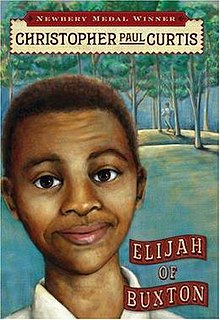Elijah of Buxton
 | |
| Author | Christopher Paul Curtis |
|---|---|
| Country | United States |
| Language | English |
| Genre | Historical fiction |
| Published | 2007, Scholastic |
| Media type | Print (Hardcover and Paperback) |
| Pages | 341 |
| Awards | 2008 Coretta Scott King Author Award Newbery Honor |
| ISBN | 0-439-02344-0 |
| OCLC | 86090238 |
| LC Class | PZ7.C94137 El 2007 |
| Followed by | The Madman of Piney Woods |
Elijah of Buxton is a 2007 children's novel by Christopher Paul Curtis. The book won critical praise and was a Newbery Honor[1] book and the winner of the Coretta Scott King Award.[2] It also was a children's book bestseller.[3]
Summary[edit]
Elijah of Buxton is about an eleven-year-old boy, Elijah Freeman, who lives in Buxton, Canada. It was started as the Elgin Settlement, a refugee camp for African-American slaves who escaped via the Underground Railroad to gain freedom in Canada. Elijah is the first free-born child in the settlement, and has never lived under slavery. He has only heard of it. He goes into the United States to help stop a man from his settlement from stealing money from his friend, and learns there that it is a privilege to be free.
Reception[edit]
Elijah of Buxton has been well received. School Library Journal called it "an example of everything Curtis does well. His historical research is superior. His characters heartwarming. His prose funny and heart-wrenching in turns." and "A great book and well deserving of any buzz it happens to achieve."[4] Kirkus Reviews gave a starred review, declaring "This is Curtis’s best novel yet, and no doubt many readers, young and old, will finish and say, "This is one of the best books I have ever read.""[5]
Publishers Weekly wrote, "The arresting historical setting and physical comedy signal classic Curtis (Bud, Not Buddy), but while Elijah's boyish voice represents the Newbery Medalist at his finest, the story unspools at so leisurely a pace that kids might easily lose interest." and "The powerful ending is violent and unsettling, yet also manages to be uplifting."[6] Common Sense Media awarded it five stars, calling it a "humorous, powerful, masterful escape-slave tale" and asserted "This wonderful, moving novel is sure to become a staple of discussion groups in schools and libraries across the country."[7]
Awards[edit]
It has won a number of awards including a 2008 Newbery Honor,[8] the 2008 Coretta Scott King Award,[9] the 2008 Scott O'Dell Award for Historical Fiction,[10] and the 2008 Canadian Library Association Book of the Year for Children Award[11]
References[edit]
- ^ "Newbery Medal and Honor Books, 1922-Present". American Library Association. 2009. Archived from the original on 2011-02-11. Retrieved 2009-12-31.
- ^ "Coretta Scott King Book Award Recipients: Current and Past". American Library Association. 2009. Archived from the original on 2011-04-06. Retrieved 2009-12-30.
- ^ "CHILDREN'S BEST SELLERS: CHAPTER BOOKS: Sunday, March 9th 2008". New York Times. 9 March 2008. pp. 18, Section 7.
- ^ Elizabeth Bird (28 June 2007). "Review of the Day: Elijah of Buxton by Christopher Paul Curtis". www.slj.com. School Library Journal. Retrieved 15 October 2015.
- ^ "Elijah of Buxton". www.kirkusreviews.com. Kirkus Media LLC. 15 August 2007. Retrieved 15 October 2015.
- ^ "Elijah of Buxton". www.publishersweekly.com. PWxyz LLC. Retrieved 15 October 2015.
- ^ "Elijah of Buxton". www.commonsensemedia.org. Common Sense Media Inc. Retrieved 15 October 2015.
- ^ "Newbery Medal and Honor Books, 1922-Present | Association for Library Service to Children (ALSC)". American Library Association. Archived from the original on 2011-02-11. Retrieved 2014-04-14.
- ^ "Coretta Scott King Book Award Recipients | Ethnic & Multicultural Information Exchange Round Table (EMIERT)". American Library Association. Archived from the original on 2011-04-06. Retrieved 2014-04-14.
- ^ "Scott O'Dell Award". Archived from the original on 2015-04-13. Retrieved 2011-04-20.
- ^ "Canadian Library Association | Book of the Year for Children Award". Cla.ca. 2005-04-19. Archived from the original on 2014-04-15. Retrieved 2014-04-14.
- 2007 American novels
- Newbery Honor-winning works
- Novels by Christopher Paul Curtis
- Canadian children's novels
- Novels set in Ontario
- Children's historical novels
- American historical novels
- Works about the Underground Railroad
- African-American novels
- 2007 children's books
- Coretta Scott King Award-winning works
- Children's books set in Ontario
- Children's books about African-American history
- Children's books set in the 19th century
